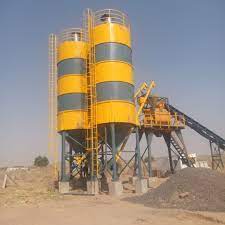
CEMENT FLY ASH STORAGE
Description:
A cement fly ash storage silo is a robust, cylindrical container made of durable materials such as reinforced concrete or steel. Its primary purpose is to store bulk quantities of cement and fly ash, which are essential components in the production of concrete and other construction materials. These silos are commonly found at concrete batching plants, cement manufacturing facilities, and construction sites.
Product Feature
1. Capacity:
Cement fly ash storage silos come in various sizes and capacities, ranging from
a few tons to several hundred tons, depending on the needs of the operation.
2. Material
Handling: They are equipped with mechanisms for easy loading and unloading of
cement and fly ash. This typically includes conveyors, pneumatic systems, or
screw augers to transport the materials.
3. Airtight:
To maintain the quality of the stored materials and prevent moisture and
contaminants from entering, these silos are often designed to be airtight or
equipped with sealing systems.
4. Safety
Measures: Safety features like pressure relief valves, level indicators, and
dust collection systems are incorporated to ensure safe and efficient
operation.
5. Weather
Protection: Some silos may have weatherproofing features to protect the
contents from rain, wind, and temperature fluctuations.
6. Insulation:
In cold climates, insulation may be added to prevent temperature variations
that can affect the quality of cement and fly ash.
7. Monitoring
and Control: Modern silos may be equipped with advanced monitoring and control
systems to track inventory levels and automate material replenishment
Product Application
Benefits:
- Efficiency: Cement fly ash storage silos streamline construction processes by providing a steady supply of essential materials, reducing downtime.
- Quality Control: They help maintain the quality of cement and fly ash by protecting them from moisture and contamination.
- Space Saving: Vertical storage in silos saves valuable horizontal space compared to traditional storage methods like piles or open bins.
- Environmental Impact: Properly designed silos can
minimize material wastage and environmental pollution..




